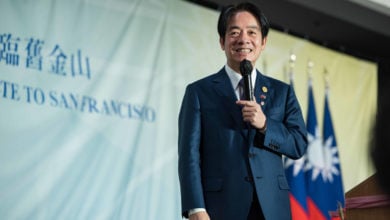Photo: Leaders of the G7 nations plus the European Union in Hiroshima
The leaders of the most powerful capitalist empires gathered in Japan over the weekend to hold a summit of the “G7” powers — the United States, UK, France, Canada, Italy, Japan and Germany. While their deliberations, held in Hiroshima, touched on a wide range of issues, there was one common goal present throughout the meeting — intensify the new Cold War atmosphere in world politics by recklessly deepening key conflicts.
Ukrainian President Volodymyr Zelenskyy was the de facto guest of honor at the summit. Arriving on Saturday, Zelenskyy held a flurry of meetings and events to solidify his standing among the main sponsors of the proxy war that pits his country against Russia. In his main speech, Zelenskyy reminded his patrons how they are all effectively co-combatants in the war: “For almost 15 months of full-scale war, we’ve made hundreds of security decisions together. These include the formation of coalitions of defense support, sanctions against the aggressor, protection of markets, including the energy and food markets, and protection of Ukraine’s financial stability.”
The day before Zelenskyy landed in Hiroshima, the Biden administration unveiled a massive escalation of the war. The Pentagon will now seek to facilitate the transfer of highly sought-after F-16 fighter jets to Ukraine, and the training of Ukrainian pilots to fly them. For months, even the U.S. government resisted aggressive lobbying by Ukraine to secure these jets. But as the eve of the G7 summit opened, this was reversed in a move that takes the world even further down the path towards catastrophe.
Biden met with Zelenskyy and pledged, “Together with the entire G7, we have Ukraine’s back and I promise we’re not going anywhere.” An official statement from the summit promised that, “Our support for Ukraine will not waver.” Host of the summit, Japanese Prime Minister Fumio Kishida, assured that the G7 will provide “strong backing for Ukraine from every possible dimension.”
While imperialist diplomacy played out in the comfort of the summit, dramatic events were unfolding on the battlefield in Ukraine. The town of Bakhmut was captured by the Russian military after months of intense fighting that became the focal point of the war. But at the same time, the Ukrainian armed forces were conducting final preparations for a highly-anticipated counteroffensive that could see the greatest risk yet of the war escalating into a direct clash between NATO and Russia.
Hostility to China a central theme
China, which along with Russia is the principal adversary in the U.S. government’s new Cold War, was also a top target at the summit. The official declaration pledged that the G7 would, “address the challenges posed by China’s non-market policies and practices, which distort the global economy” and “counter malign practices.” This is code for taking action to prevent China’s continued economic development. The statement also expressed that the leaders were, “seriously concerned about the situation in the East and South China Seas” and echoed separatist talking points on Taiwan, Tibet and Xinjiang. These issues are related to the territorial integrity of China, something that is of the utmost importance to the country’s government and could be the basis for a direct military clash.
A spokesperson for the Chinese Foreign Ministry responded to this hostility by noting, “the G7 used issues concerning China to smear and attack China and brazenly interfere in China’s internal affairs … gone are the days when a handful of Western countries can just willfully meddle in other countries’ internal affairs and manipulate global affairs. We urge G7 members to catch up with the trend of the times.”
Along the sidelines of the G7 meeting, leaders of the “Indo-Pacific Quad” countries also held a meeting. The Quad was established in 2017 as part of the U.S. strategy to encircle and contain China, and is made up of the United States, Japan, India and Australia. While it stopped short of naming China, the joint statement issued by the Quad countries all but accused the country of “destabilizing or unilateral actions that seek to change the status quo by force or coercion.” Of course, it is actually the U.S. government that for generations has based its entire foreign policy on unilateral action employing force or coercion.
China was especially alarmed at the rhetoric coming out of the G7 summit because of several recent geopolitical developments. Last month, the right-wing president of South Korea, Yoon Suk Yeol, traveled to the White House to meet with Joe Biden and issue the “Washington Declaration.” This aimed to solidify South Korea’s subordinate role to the U.S. war machine by deepening military coordination, including the regular deployment of U.S. submarine-based nuclear weapons to the Korean peninsula. Then, less than two weeks later, Japanese Prime Minister Kishida went to South Korea for talks aimed at bringing the two countries closer together for the sake of mutual confrontation with China and North Korea. Last December, Kishida’s government announced the country would embark on its largest military build-up since World War II.
It is a true irony that this gathering took place in Hiroshima — the place where the U.S. military criminally carried out the first attack in history using nuclear arms. While the leaders visited the city’s Peace Park dedicated to the bomb’s victims and spouted hollow rhetoric about disarmament, their actions at the summit brought the world closer to the brink of a catastrophic global confrontation where this type of weapon could bring about the end of life on Earth as we know it.






